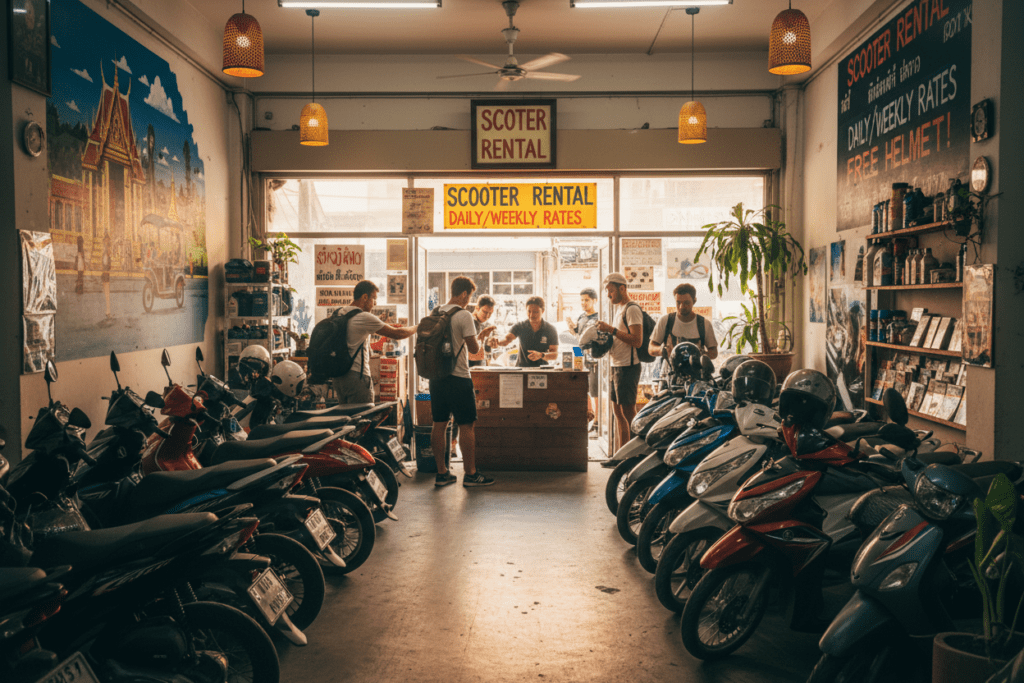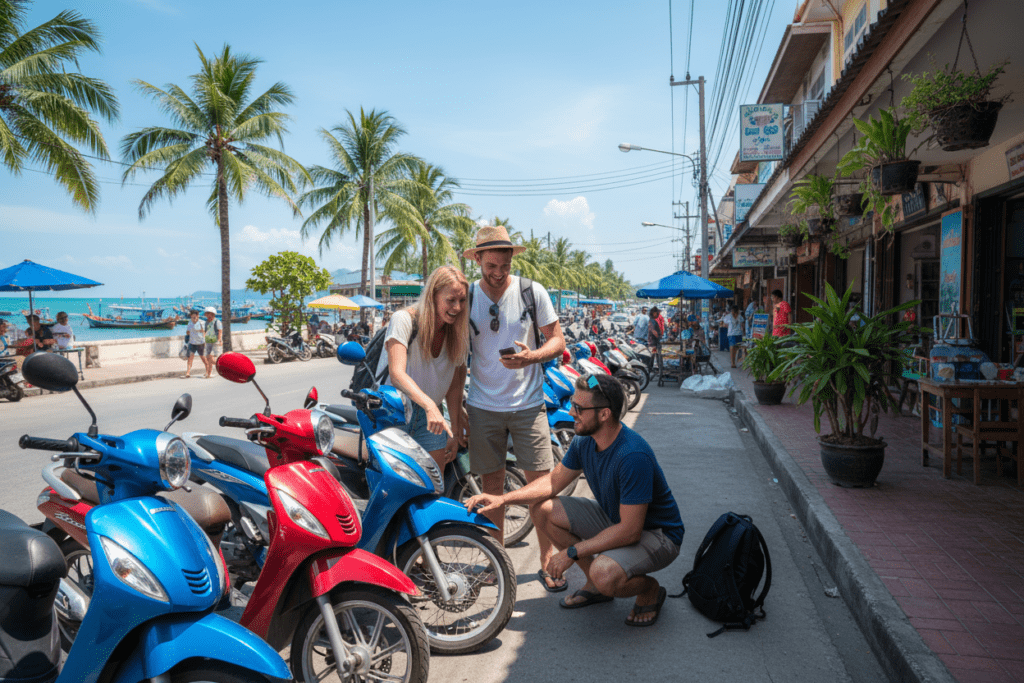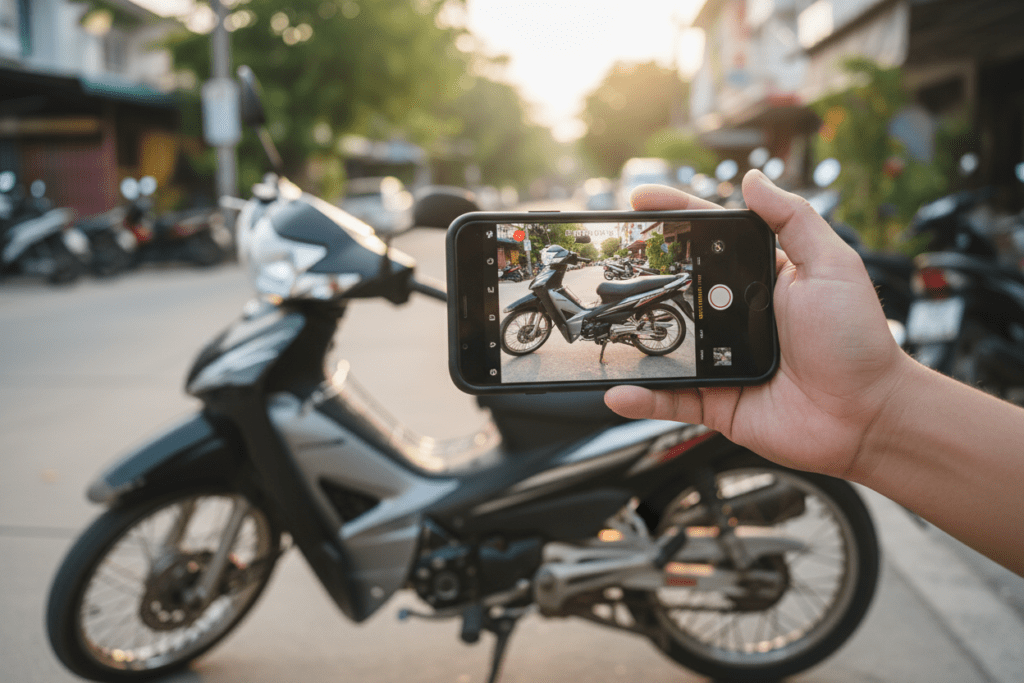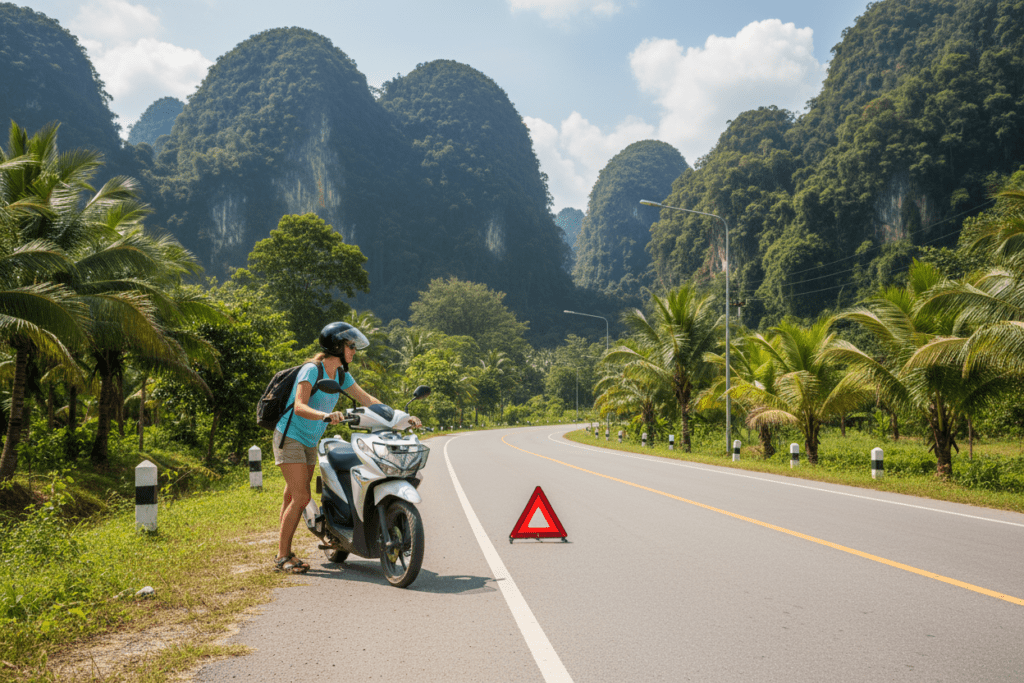Estimated reading time: 12 minutes
Key Takeaways
- Around 40% of Thailand’s 35+ million annual tourists rent scooters, but many face serious problems due to informal business practices
- Never leave your original passport as a deposit – this is how tourists get trapped in expensive scams
- Document everything with timestamped photos and videos before renting to protect against false damage claims
- You need a motorcycle license plus International Driving Permit with motorcycle endorsement – car licenses aren’t sufficient
- Contact Tourist Police at 1155 if disputes escalate – they specialize in helping tourists with rental issues
- Choose reputable rental shops or modern platforms like Byklo.rent to minimize risks from unregulated operators
Table of Contents

Picture this: you’re weaving through Thailand’s stunning mountain roads on a scooter, the warm breeze hitting your face as you discover hidden temples and pristine beaches at your own pace. From the bustling streets of Bangkok to the winding coastal roads of Phuket, the freedom of exploring Thailand on two wheels is absolutely unmatched.
There’s a reason why motorbikes are everywhere in Thailand. Research shows that around 40% of Thailand’s 35+ million annual tourists rent a scooter during their stay. It’s practical, affordable, and honestly the best way to get around congested cities where cars just don’t make sense.
But here’s the thing nobody tells you in those glossy travel brochures – many travelers encounter serious motorbike rental problems Thailand that can turn a dream trip into a complete nightmare. I’m talking about scams, surprise damage fees, breakdowns in the middle of nowhere, and disputes that leave you stranded without your passport.
Don’t worry though. I’ve been there, done that, and learned the hard way so you don’t have to. This guide will walk you through everything you need to know to avoid these pitfalls, handle problems when they arise, and actually enjoy your Thai adventure on two wheels.

Why Are Thailand Rental Scooter Issues So Common?
You might wonder why renting a scooter in Thailand feels like navigating a minefield compared to other countries. The answer lies in how the industry operates here.
Most rental shops in tourist areas are small, family-run businesses that haven’t exactly embraced modern business practices. We’re talking about operations that still rely on handwritten receipts, cash-only transactions, and contracts that are literally photocopied from your passport. The entire system is built on manual bookings with little to no digital infrastructure or consistent standards. It’s like stepping back in time, but not in a charming way.
This informal approach creates chaos. Two people can walk into the same shop and pay completely different prices for identical bikes. There’s no standard policy for deposits, damage claims, or what happens when things go wrong. Everything’s negotiable, which sounds great until you’re on the losing end of that negotiation.
Then there’s the maintenance issue. With millions of tourists wanting to rent bikes year-round, these scooters are in constant use. Some operators get so focused on quick turnover that proper maintenance becomes an afterthought. You end up with overworked bikes held together by duct tape and prayers.
The language barrier makes everything worse. Try explaining complex insurance terms or legal requirements when neither party speaks the other’s language fluently. Most tourists have no idea that their regular driver’s license isn’t enough – Thai law often requires a specific motorcycle license, and ignorance of this fact has landed countless travelers in expensive trouble.
Thailand rental scooter issues aren’t just bad luck. They’re the inevitable result of a system that’s grown organically without much regulation or standardization.

How to Avoid Motorbike Rental Scams: Your Pre-Rental Checklist
Let me save you from the most expensive mistakes you can make. Follow this checklist religiously, and you’ll dodge 90% of the problems that trap other tourists.
Step 1: Choose a Reputable Shop
Do your homework before you even leave your hotel. Look for shops with professional websites, recent positive reviews on Google Maps, and a physical presence that looks legitimate. Avoid places with consistently negative feedback or those hole-in-the-wall operations that seem too good to be true.
The traditional rental model is slowly changing though. Consider using a modern platform like Byklo.rent, which connects you with pre-vetted rental partners and adds a layer of trust and standardization to the whole process. It takes the guesswork out of finding reliable operators.
Step 2: Inspect and Document EVERYTHING
This is absolutely the most critical step to how to avoid motorbike rental scams. I cannot stress this enough – you need to perform a detailed inspection of that bike with the shop employee standing right there watching you.
Take out your phone and record a continuous video. Walk slowly around the entire bike, zooming in on every single scratch, dent, scuff mark, and imperfection. Don’t feel embarrassed about being thorough – this video could save you hundreds of dollars later. Also grab close-up, timestamped photos of any significant damage.
But don’t stop at cosmetics. Test both front and rear brakes to make sure they actually work. Check that the headlights work on both high and low beam. Verify the brake lights and turn signals function properly. Honk the horn. Check the tire tread for dangerous wear. If anything seems off, point it out immediately and decide whether you want that particular bike.
For a concise pre-rental walkthrough, refer to our Motorbike Rental Checklist Thailand: 5-Minute Inspection.
Step 3: Clarify the Agreement and Payment
Demand a written contract in English. No exceptions. If they only offer handshake deals or refuse to put terms in writing, walk away immediately. That’s a massive red flag.
Get crystal clear on the daily or weekly rate, the exact deposit amount, and the fuel policy. Some places want you to return it full, others just want the same level it had when you picked it up. Confirm what happens if you’re late returning the bike.
Here’s the most important warning I can give you: NEVER, EVER leave your original passport as a deposit. I don’t care how legitimate the shop looks or how much they insist it’s “normal.” Reputable businesses will accept a cash deposit or a photocopy of your passport. If they demand your actual passport, turn around and find another shop. Your passport being held hostage is how tourists get trapped in expensive scams.
Step 4: Verify Your License and Insurance
Make sure you have the right documentation. You typically need your home country’s motorcycle license PLUS an International Driving Permit with a motorcycle endorsement. Just having a car license isn’t enough, even though some shops will rent to you anyway. For step-by-step instructions on obtaining your IDP, check out our International Driving License Thailand Guide.
Ask detailed questions about insurance coverage. Many basic policies only cover third-party liability, meaning if you damage the rental bike itself, you’re paying out of pocket. Understand what the deductible is and what situations void your coverage entirely. For more on choosing the right coverage, see our Motorbike Rental Insurance Thailand: A Complete Guide to Coverage, Costs & Policies.

On the Road: When Trouble Strikes (Breakdowns & Disputes)
Even with perfect preparation, things can still go wrong. Here’s your game plan for handling the most common road emergencies.
When Your Scooter Breaks Down
First, get to safety immediately. Pull over to the side of the road, away from traffic, and turn off the engine. Don’t try to restart it right away or you might make the problem worse.
Next, call the rental shop using the emergency number on your contract. Clearly explain where you are – use Google Maps to give them your exact location or describe nearby landmarks. Thai GPS addresses can be confusing, so being specific helps.
Document everything with timestamped photos. Show the bike where it broke down and take a picture of the odometer reading. This protects you from claims that you caused additional damage by continuing to ride or that you were somewhere you shouldn’t have been.
Follow the rental company’s instructions carefully. They should arrange for a repair or replacement bike. Don’t authorize any major repairs without their explicit consent, because you might not get reimbursed for unauthorized work.
Motorbike Rental Troubleshooting Thailand
Learn to distinguish between minor and major issues. A loose mirror or burnt-out bulb? That might be a quick, cheap fix at any local mechanic. But anything involving the engine, brakes, or steering requires an immediate call to the rental shop.
Get in the habit of doing a quick 30-second safety check before every ride. Look at the tires for obvious problems, squeeze the brake levers to make sure they feel normal, and check that your lights work. It takes almost no time but could prevent serious accidents. For additional on-road safety advice, don’t miss our Top 10 Tips for Staying Safe While Riding a Motorbike in Thailand.
Handling Motorbike Rental Disputes Thailand
Disputes usually happen when you return the bike, typically over damage claims. Stay calm and polite, even if the shop owner gets aggressive or unreasonable.
Present your evidence immediately – those timestamped photos and videos you took before renting. This documentation is your strongest defense against false damage claims. Don’t let them pressure you into admitting fault for pre-existing damage.
If the situation escalates and the shop owner becomes hostile, don’t argue. Simply state that you’ll be contacting the Tourist Police. Dial 1155 – this is a dedicated force specifically for helping tourists, and they’ve seen these exact situations countless times. Shop owners usually become much more reasonable when they hear those magic words.
If you get unfairly charged on your credit card, you can dispute the charge with your bank when you get home. Your photo evidence will support your dispute claim.
Common Thailand Rental Scooter Issues & Solutions
Let me give you a quick reference guide for the problems you’re most likely to encounter:
The “Pre-existing Damage” Scam: This is when they claim you caused damage that was already there when you rented the bike. Solution: Take extensive, timestamped photos and video before renting. Point out all existing damage to staff and make sure they acknowledge it.
Inadequate Insurance Coverage: You think you’re covered, but the policy is basically worthless. Solution: Get insurance details in writing before renting. Understand that you’re likely liable for damage to the rental bike itself. Make sure your travel insurance offers some motorcycle coverage.
Poorly Maintained Bike: The bike breaks down because it wasn’t properly maintained, but somehow that becomes your problem. Solution: Rent from reputable shops only. Do a thorough pre-rental check of brakes, tires, lights, and engine sounds.
Passport Held Hostage: They refuse to return your passport until you pay inflated damage claims. Solution: Never leave your original passport as a deposit. Walk away from any shop that insists on this practice.
Fuel Level Disputes: Arguments over whether you returned the bike with enough gas. Solution: Take a photo of the fuel gauge when you pick up the bike. Refill to the exact same level before returning.
These Thailand rental scooter issues are predictable and preventable if you know what to watch for.
Ready to Ride Smart
Renting a motorbike in Thailand can absolutely be an incredible experience – you just need to go in with your eyes wide open. The key to avoiding motorbike rental problems Thailand is preparation, documentation, and knowing your rights.
Remember the three golden rules: choose your rental shop wisely, document absolutely everything, and know that the Tourist Police (1155) are there to help if things go sideways.
The vast majority of rentals go smoothly when you follow these guidelines. Don’t let the potential problems scare you away from one of the best ways to explore Thailand. Just be smart about it.
For those who want to minimize risk from the start, exploring options like Byklo.rent can help ensure you’re dealing with legitimate, professional operators rather than taking your chances with random street-side shops.
The freedom of exploring Thailand on two wheels is absolutely worth it when you do it right. Take these precautions seriously, trust your instincts, and you’ll have stories to tell for years to come – the good kind of stories.
Frequently Asked Questions
What should I do if the rental shop demands my original passport as a deposit?
Walk away immediately. Reputable rental shops will accept a cash deposit or photocopy of your passport. Never leave your original passport as it can be held hostage for inflated damage claims. This is a major red flag indicating potential scam operations.
What type of license do I need to legally rent a motorbike in Thailand?
You need a motorcycle license from your home country PLUS an International Driving Permit (IDP) with a motorcycle endorsement. A regular car license is not sufficient under Thai law, even though some shops may still rent to you.
How can I protect myself from false damage claims?
Take extensive timestamped photos and record a continuous video inspection of the entire motorbike before renting. Document every scratch, dent, and imperfection with the shop employee present. This evidence is your strongest defense against false damage claims.
What should I do if my rental scooter breaks down?
Pull over safely away from traffic, turn off the engine, and call the rental shop immediately using their emergency number. Document the breakdown with timestamped photos and your exact location. Don’t attempt repairs or restart the engine without their guidance.
Who should I call if I have a serious dispute with a rental shop?
Contact the Tourist Police at 1155. They specialize in helping tourists with rental disputes and scams. Shop owners typically become more reasonable when they know you’re involving the Tourist Police.
What insurance coverage should I expect with a rental scooter?
Most basic policies only cover third-party liability, meaning you’re liable for damage to the rental bike itself. Always get insurance details in writing and understand the deductible and coverage limitations. Consider supplemental travel insurance with motorcycle coverage.
Are there safer alternatives to traditional street-side rental shops?
Yes, modern platforms like Byklo.rent connect you with pre-vetted rental partners, adding standardization and trust to the process. These platforms typically offer better customer protection than informal street-side operations.


